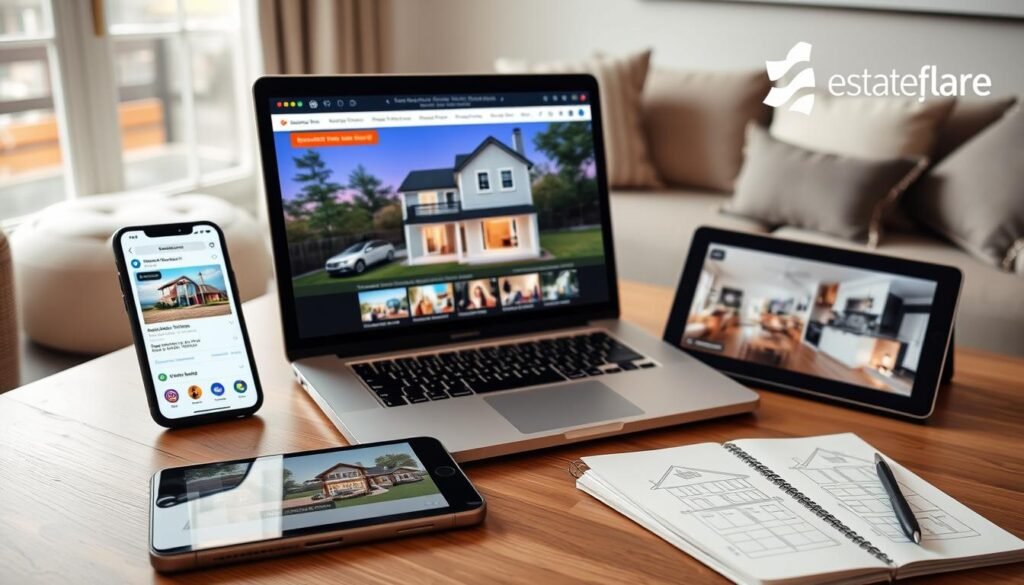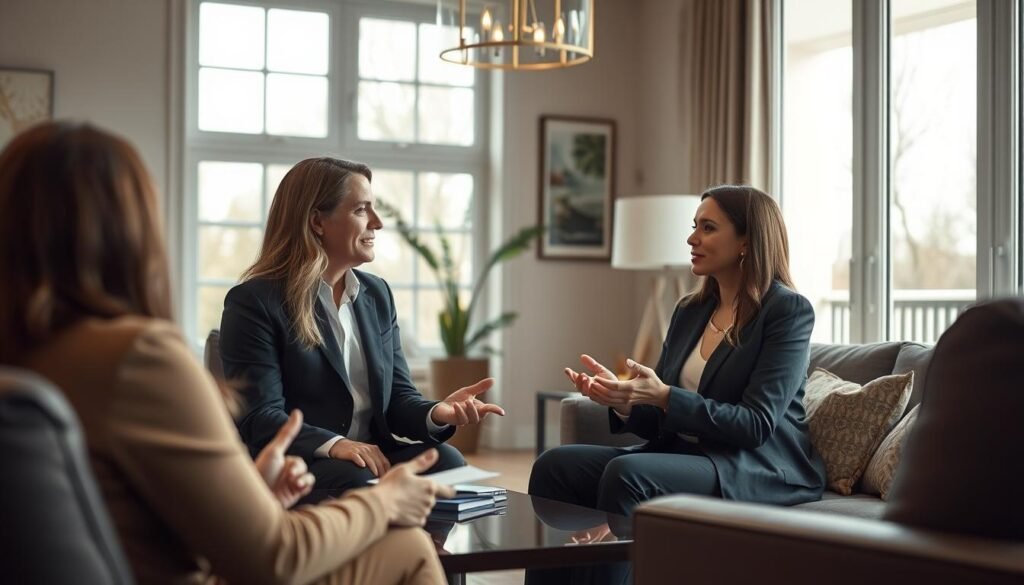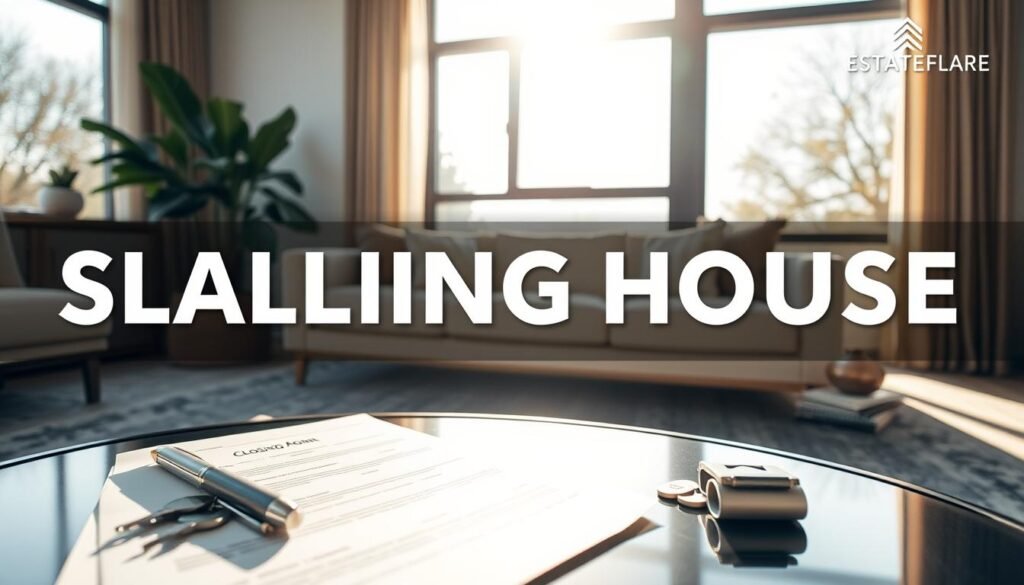Did you know almost 35% of home sales in the U.S. happen without a real estate agent? This shows more homeowners are taking charge of their sales. In this guide, we’ll share 15 key tips for selling your home without an agent. We’ll cover everything from getting your property ready to closing the deal.
Key Takeaways
- Understand the benefits of selling your home without an agent to increase your profits.
- Learn effective strategies for preparing and staging your property to attract potential buyers.
- Discover how to price your home competitively using comparative market analysis.
- Create engaging marketing materials and leverage online platforms to showcase your property.
- Master the art of negotiation and build rapport with prospective buyers.
Preparing Your Property for Sale
Before you list your property, it’s key to get it ready for sale. This means decluttering, staging, and making sure repairs are done. These steps help make your property look great and inviting. This will attract potential buyers and show off your property’s value proposition.
Decluttering and Staging for Maximum Appeal
The first thing to do is declutter. Take out any items you don’t need, personal stuff, and extra furniture. This makes the space feel open and welcoming. It lets buyers see themselves living there.
Then, stage your property. Arrange furniture and decor to show off its best features. Staging helps buyers see the property’s potential. It makes it easier for them to imagine living there.
Ensuring Proper Repairs and Maintenance
Don’t forget to fix any repairs and maintenance issues before listing. This includes the roof, plumbing, and electrical systems. Fixing these tips for selling shows the property is well-kept. It makes it more appealing to buyers.
By decluttering, staging, and fixing up your property, you make it look amazing. This will attract buyers and increase your home’s value.
| Decluttering Checklist | Staging Tips |
|---|---|
|
|
Pricing Your Property Competitively
Finding the right price for your property is key to a successful sale. A thorough comparative market analysis can help you find the perfect price. This approach attracts buyers and maximizes your profits. Our tips for selling and sales strategies will guide you. They help you set a strong value proposition for your home.
Conducting a Comparative Market Analysis
To price your property right, research recent sales of similar homes. This analysis gives you insights into the market. It helps you find the best price range for your listing. Here’s how to do it:
- Gather data on comparable properties: Find homes in your area that match your home in size, features, and condition.
- Analyze the sale prices: Look at the final sale prices of these homes. Consider factors like the sales date, condition, and negotiations.
- Consider market trends: Check how the local real estate market is doing. Look at supply, demand, and average days on the market.
- Adjust for unique features: Adjust your price based on your property’s special features that might affect its value.
| Comparable Property | Sale Price | Bedrooms | Bathrooms | Square Feet |
|---|---|---|---|---|
| 123 Main St. | $350,000 | 3 | 2 | 1,800 |
| 456 Oak Ave. | $375,000 | 4 | 2.5 | 2,100 |
| 789 Elm Rd. | $325,000 | 3 | 2 | 1,700 |
By analyzing this data, you can find the best price range for your property. This ensures you offer a competitive value proposition to buyers.

Creating Effective Marketing Materials
When selling your home without an agent, making great marketing materials is key. Use top-notch photos and virtual tours to show off your property. This will grab the attention of potential buyers and spark their interest.
Professional Photography and Virtual Tours
Good photos make a great first impression. Hire a professional photographer to highlight your home’s best features. Add interactive virtual tours so buyers can see your home from anywhere.
This combo makes your home stand out and connects with your audience.
- Leverage professional photography to showcase your home’s most appealing aspects
- Create virtual tours that enable prospective buyers to experience your property remotely
- Leverage these marketing tools to generate excitement and interest in your home
Investing in quality marketing materials shows the value of your home. It meets the needs of your target buyers. These efforts are crucial for a successful sales strategy and a great selling outcome.
Tips for Selling: Leveraging Online Platforms
In today’s digital world, using online platforms is key to finding more buyers. By using different online channels, you can market your property well. This helps you connect with buyers and boosts your sale chances.
Here are some great tips for using online platforms to your advantage:
- Optimize Your Listings on Real Estate Websites – Make sure your property listings on real estate sites look good and are easy to find. Show off what makes your home special to grab buyers’ interest.
- Leverage Social Media Platforms – Use social media like Facebook, Instagram, and Twitter to promote your property. Share eye-catching photos, talk to your followers, and use ads to reach more people.
- Explore Online Classified Ads – Post your property on sites like Craigslist or Zillow to find more buyers. Write a great description and use top-notch photos to stand out.
- Optimize Your Online Presence – Make sure your website or online platform is easy to use and search-friendly. This helps buyers find and learn about your property easily.
- Utilize Virtual Showings and Tours – Use technology to offer virtual tours of your property. This makes it easy for buyers to see your home, even from far away, and reaches more people.
By using these online strategies, you can tap into a huge pool of buyers. This boosts your property’s visibility and increases your sale chances.

“In today’s digital landscape, online platforms have become the gateway to reaching potential buyers. Embrace these tools to showcase your property and connect with the right audience.”
Crafting Compelling Property Descriptions
Writing a good property description is key to showing off your home. It should highlight what makes your property special. This way, you grab the interest of people who might buy it.
Highlighting Key Features and Benefits
When you write your description, focus on the best parts of your home. Find what makes it stand out and write in a way that speaks to what buyers want. Effective communication is crucial for a description that really connects with people.
- Showcase the property’s standout features, such as spacious rooms, modern amenities, or prime location.
- Highlight the practical benefits that align with the customer needs, like energy efficiency, ample storage, or a convenient floor plan.
- Use vivid, descriptive language to paint a picture of the lifestyle your home can offer, evoking emotions and creating a sense of aspirational living.
| Feature | Benefit |
|---|---|
| Newly renovated kitchen | Streamlined workflow and increased functionality for the modern home cook |
| Expansive backyard oasis | Ample space for entertaining, relaxing, and enjoying the outdoors |
| Optimal location near top-rated schools | Ideal for families seeking a high-quality education for their children |
By focusing on the best features and value proposition in your description, you can draw in potential buyers. This sets the stage for a successful selling journey.
Negotiating with Prospective Buyers
Negotiating with buyers is an art that needs skill and finesse. As experienced real estate pros, we’ll share strategies for effective negotiation. You’ll learn to understand buyer motivations and create win-win scenarios.
Understanding the Art of Negotiation
Successful negotiations depend on empathy and finding common ground. By mastering sales psychology and negotiation skills, you can craft sales strategies for favorable outcomes. This keeps the relationship with the buyer positive.
Key negotiation principles include:
- Active listening: Understand the buyer’s needs and concerns to tailor your approach.
- Identifying win-win solutions: Look for creative options that benefit both sides.
- Maintaining composure: Stay calm and professional, even in tough negotiations.
- Leveraging data and market insights: Use facts about tips for selling and comparable properties to support your position.
| Negotiation Tactic | Description | Potential Outcome |
|---|---|---|
| Anchoring | Setting the initial price or offer as a reference point for the negotiation | Influences the buyer’s perception of value and perceived fairness |
| Concessions | Offering strategic concessions to build rapport and reach a mutually beneficial agreement | Allows for a sense of “winning” on both sides, fostering a positive outcome |
| Compromise | Finding a middle ground that satisfies the needs of both the seller and the buyer | Facilitates a collaborative negotiation process and a lasting agreement |
By mastering these negotiation skills and understanding sales psychology, you’ll excel in negotiating with buyers. You’ll secure the best outcome for your property sale.

Handling Showings and Open Houses
Showing and hosting open houses are key when selling your home without an agent. By using the right strategies, you can make a great impression on potential buyers. This can help you get more offers.
First, time your showings and open houses right. Don’t pick times like during meals or late at night. Also, check for other events in the area. Try to schedule them when people are most likely to be free.
During the showing or open house, let the agent take the lead. They know how to talk to buyers and guide them. Your job is to make sure the house looks great. This means decluttering, staging, and making the outside look nice.
- Declutter and depersonalize the space to allow buyers to envision themselves living there.
- Thoroughly clean the property, paying special attention to areas like the kitchen and bathrooms.
- Enhance curb appeal by maintaining the landscaping, cleaning the exterior, and making any necessary repairs.
The goal is to make the house feel welcoming. This lets buyers envision themselves living in the property. By following these tips, you can have a successful showing or open house. This will help you improve your chances of selling your home without an agent.
Building Rapport with Potential Buyers
Building a strong rapport with potential buyers is key to a successful home sale. By listening to their needs and communicating well, we can understand their motivations. This helps us tailor our approach to meet their expectations. It builds trust, fosters a positive relationship, and leads to a favorable outcome for both sides.
Active Listening and Effective Communication
Effective communication is the foundation of rapport with potential buyers. We should listen to their concerns, questions, and preferences. Then, we should respond clearly, concisely, and with empathy. This shows we’re genuinely interested in their needs and committed to helping them find the right property.
Here are some tips for effective communication when selling a home without an agent:
- Ask open-ended questions to encourage the buyer to share their thoughts and feelings.
- Paraphrase and summarize the buyer’s statements to demonstrate that we have understood their perspective.
- Avoid using jargon or overly technical language, and instead, speak in a way that is easy for the buyer to understand.
- Be an active listener, focusing on the buyer’s words and body language to better gauge their reactions and concerns.
- Tailor our communication style to the buyer’s preferences, whether they prefer a more formal or casual approach.
By mastering active listening and effective communication, we can build a strong rapport with potential buyers. This establishes trust and increases the chance of a successful sale. This sales psychology approach is a valuable asset in tips for selling a home without an agent.
| Effective Communication Techniques | Benefits |
|---|---|
| Open-ended questions | Encourages buyer to share thoughts and feelings |
| Paraphrasing and summarizing | Demonstrates understanding of buyer’s perspective |
| Avoiding jargon and technical language | Ensures clear and easy-to-understand communication |
| Active listening | Helps gauge buyer’s reactions and concerns |
| Tailoring communication style | Builds rapport and trust with the buyer |
By using these effective communication strategies, we can improve our rapport with potential buyers. This significantly increases our chances of a successful home sale.
“The key to successful selling is to focus on the needs of the buyer, not the needs of the seller.” – Zig Ziglar
Managing Legal and Financial Considerations
When you sell your property without an agent, you must handle the legal and financial parts carefully. You need to know about contracts, disclosures, and closing. Planning well and paying attention to details are crucial. Let’s look at the important things to remember.
Understanding Contracts and Disclosures
Selling a property means dealing with many legal documents and agreements. As a DIY seller, you should learn about the contracts and disclosures needed in your state. This includes the purchase agreement, title transfer documents, and property disclosures. Knowing these documents well helps protect your interests during the sale.
To understand the legal considerations of selling your home, follow these tips:
- Learn about your state’s real estate laws and regulations to know the needed paperwork.
- Get advice from a real estate attorney to check the contract and answer any questions.
- Be open about the property’s condition and history by giving detailed disclosures.
- Know the financial side of the sale, like capital gains taxes and other financial considerations.
By being informed and proactive, you can handle the legal and financial parts of selling your home confidently. This way, you can make sure the sale goes well.
Navigating the Closing Process
As you near the end of your house-selling journey, the closing process is the final step that requires your attention. This critical phase involves finalizing the paperwork, transferring ownership, and handing over the keys to the new owners. To ensure a seamless and stress-free experience, let’s explore the key steps involved in navigating the closing process.
Finalizing the Paperwork
The closing process begins with finalizing all the necessary paperwork. This includes reviewing and signing the purchase agreement, deed, and other legal documents. It’s crucial to thoroughly understand the terms and conditions to avoid any surprises or potential legal considerations.
Addressing Financial Considerations
The financial aspects of the closing process are equally important. You’ll need to settle any outstanding mortgages, taxes, or fees associated with the sale. It’s advisable to work closely with your real estate agent or a financial professional to ensure a smooth and transparent transaction.
Facilitating a Smooth Transfer of Ownership
Once the paperwork is complete, the ownership of the property will be officially transferred to the new buyer. This involves handing over the keys and any necessary documents, ensuring a seamless transition for the new owners.
By navigating the closing process with care and attention to detail, you can ensure a successful conclusion to your house-selling endeavor. Remember, staying organized, communicating effectively with all parties involved, and seeking professional guidance when needed are key to a stress-free closing experience.

“The closing process is the final frontier in the house-selling journey. With the right preparation and guidance, it can be a smooth and rewarding experience.”
Staying Motivated and Persistent
Selling your home without an agent can be tough. But, staying motivated and persistent is key to success. With the right strategies and by overcoming setbacks, you can confidently move forward and reach your goals.
Overcoming Challenges and Setbacks
When selling on your own, you might face many obstacles. These can include pricing issues and marketing challenges. Yet, a positive attitude and a desire to learn can help you get past these hurdles. Every challenge is a chance to improve and grow.
- Develop a realistic pricing strategy by conducting a thorough comparative market analysis.
- Utilize online platforms and social media effectively to reach a wider audience.
- Stay informed about the latest market trends and adjust your approach accordingly.
- Seek advice from experienced homeowners who have successfully sold their properties without an agent.
- Remain flexible and adaptable, as the process may require you to make adjustments along the way.
Being persistent is crucial when selling your home on your own. Keep a positive outlook and focus on finding solutions. This way, you can overcome any obstacles and successfully sell your home.
| Tip | Description |
|---|---|
| Embrace Challenges | View obstacles as opportunities to learn and grow, rather than setbacks. |
| Stay Informed | Continuously research the market and stay up-to-date on industry trends. |
| Seek Guidance | Connect with experienced homeowners or professionals for advice and support. |
| Maintain Flexibility | Be open to making adjustments to your strategy as needed. |
Selling your home without an agent takes dedication, resilience, and a positive mindset. By staying motivated and persistent, you can overcome challenges and achieve your goals.
Evaluating the Benefits of Selling Without an Agent
Selling your property without a real estate agent has many benefits. By taking on the sales process yourself, you can increase your property’s value. You can also meet the needs of potential buyers better.
One big advantage is saving on commission fees. These fees can be 5-6% of the home’s sale price. This means you could keep more of the profit. You also get to control the sales timeline, marketing, and negotiations. This lets you customize the selling experience to fit your needs.
- Potential for higher profits by avoiding agent commissions
- Greater control over the sales process and timeline
- Ability to personalize the marketing and negotiation strategies
But, there are also downsides to consider. Handling the legal and financial parts of a sale can be tough without an agent. You might also miss out on the agent’s network and marketing tools. Buyers might be less likely to deal with a private seller, which could lower the sale price or slow down the sale.
“Selling your home without an agent requires a significant investment of time and effort, but it can be a rewarding experience if you’re willing to take on the additional responsibilities.”
Deciding to sell without an agent should be a careful choice. You need to think about your value proposition and customer needs. By considering both sides, you can decide if this path is right for you. It will help you have a successful and fulfilling real estate sale.

FINANCING APARTMENTS AND HOUSES WITH STATE AID
Securing Professional Assistance When Needed
Thinking about selling your property without an agent can be tempting. But, there might be times when you need professional help. The legal and financial parts of selling a house can be tough. Getting advice from experts can make sure everything goes right and follows the rules.
Seeking Expert Advice for Complex Situations
If you run into problems with legal or financial stuff while selling, it’s smart to talk to a lawyer or a financial advisor. They can help with things like contracts, transferring titles, and taxes. This way, you can make smart choices and keep your interests safe.
Also, if you need tips on selling your house, a seasoned real estate agent can be very helpful. They know about pricing, marketing, and solving sales problems. Even if you’re doing it yourself, getting advice from experts can make the sale go smoothly.



